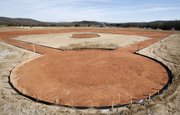FAYETTEVILLE — Kessler Mountain is home to mountain bikers and trail runners, and a proposed conservation easement would keep it that way.
Fayetteville is building the first phase of a regional park at Kessler Mountain’s base, but the more rugged land of the mountain will have a conservation easement that will preserve the trails. Supporters call it a way to keep Arkansas natural while still making natural land accessible.
In the last five years the city of Fayetteville has acquired about 642 acres on and around Kessler Mountain, said Jeremy Pate, Fayetteville development services director.
The acquisitions began after the failure of SouthPass, a planned 800-acre development at the base of the mountain which would have included hotels, restaurants, houses and a 200-acre regional park deeded to the city, Pate said. Chambers Bank acquired the property in lieu of foreclosure in 2010, and bankers kept the developers’ promise to the city of 200 acres. The bank donated an additional 48 acres and agreed to land swaps to give the city access to its property.
In 2014 the city bought 328 more acres for $3 million
— $1.5 million from city reserves and $1.5 million from a Walton Family Foundation matching grant.
Kessler Mountain Reserve will be the largest conservation easement in Fayetteville at about 400 acres if the City Council approves it early next year.
“This is probably our most involved because it’s so large,” Pate said.
The city has other conservation easements prohibiting development on the Brooks-Hummel Nature Reserve and Mount Sequoyah Woods, Pate said.
The Fayetteville Natural Heritage Association holds those conservation easements, said Bob Caulk, treasurer for the group.
The easements allow for trails and call for public access but would prevent future aldermen from selling the property or building on it. Although the heritage association has pledged $300,000 toward the property, the Kessler agreement will go through the Northwest Arkansas Land Trust.
“We have the right, if something goes wrong, to step in,” Caulk said. “The land trust has the obligation to step in. That’s different.”
Terri Lane, director of the land trust, said it lists 15,000 acres conserved in Northwest Arkansas.
Some of the land is owned by the trust, either donated by landowners or bequeathed in wills. Some of it is owned privately or, in Fayetteville’s case, publicly.
The trust draws up the legal agreement that sets limits on future development and would be responsible for a legal defense in the future.
The initial legal fees and long-term responsibilities mean the land trust requires a stewardship fee.
This year the Northwest Arkansas Land Trust was accredited through a Land Trust Alliance program. Part of that process asked about funding, Lane said.
“Nobody can fund the conservation of the property forever,” she said.
With more independent fundraising, she said she hopes the land trust’s stewardship fund could become an endowment, making funding more permanent. But formulas used by the accrediting body require a donation of between $25,000 and $30,000 to cover legal fees, monitoring and management for each piece of property.
Kessler Mountain lies partially in the Beaver Lake watershed, and part of the water runs off toward the Illinois River. The mountain is an important natural point precisely because of its divides, Caulk said.
Kessler, which reaches 1,854 feet above sea level, is the dividing point of the Springfield Plateau, which stretches north toward central Missouri, and the Boston Mountain Plateau, which runs in a narrow band across north-central Arkansas.
Caulk said the southern boundary for sugar maples lies on the property. A birder in the group noted that in some years the property was the far southern reach of the scarlet tanager, and in some years it appeared to be the far northern reach of the summer tanager.
The land caught the heritage association’s eye in 2006 through an early study marking priority areas for conservation.
In about 2009, the association started trying to persuade people to use the land as part of a strategy to save it. As people enjoyed the mountain, that built the case for its preservation, Caulk said. The city purchased the property, but the association is raising money to support it.
“It is a concrete way of demonstrating community commitment to the project,” Caulk said.
It’s hard to go backward on property, to take out the asphalt and replant old trees, said John Coleman, president of the Fayetteville Natural Heritage Association.
“None of this was eminent domain. It was not shoved down the throats of the landowners,” Coleman said.
Places that support clean water, the heritage of family farms, outdoor recreation, scenic beauty and property values should be protected, Lane said.
The recently finished openspace plan prioritizes land in Northwest Arkansas for conservation. Fayetteville already has a green infrastructure plan and enduring green network, Caulk said. Part of those plans came from the study that identified Kessler Mountain as a priority. Conserving it took time, he said.


